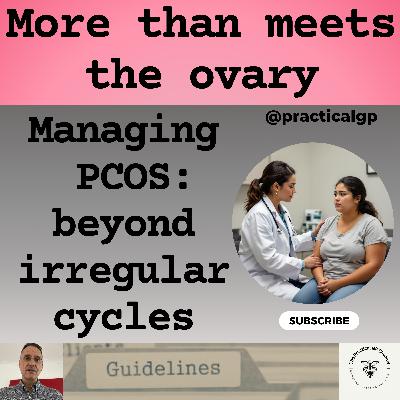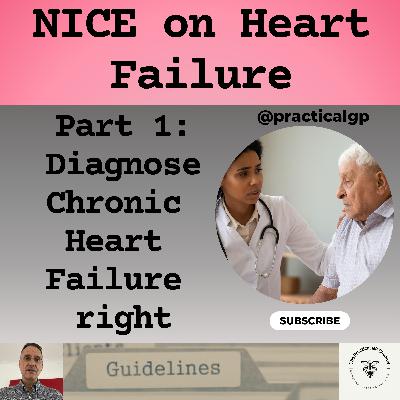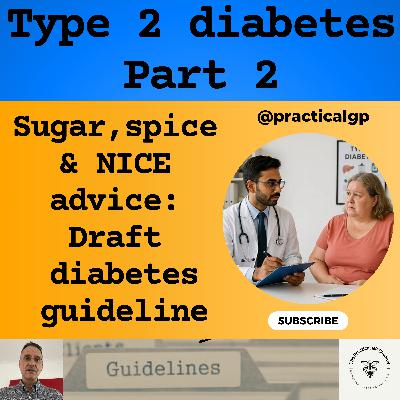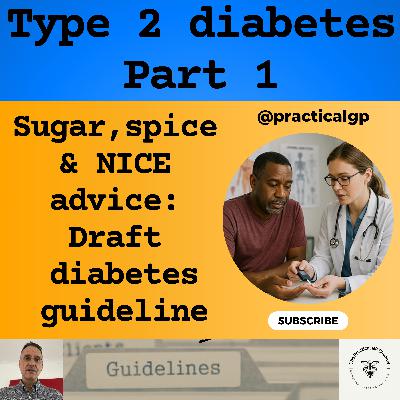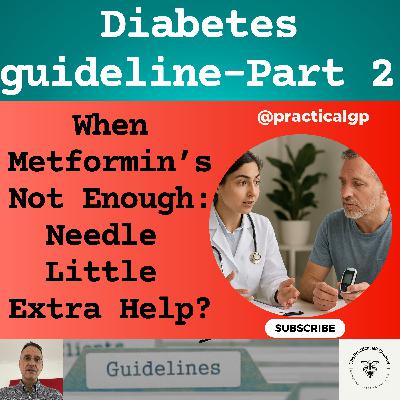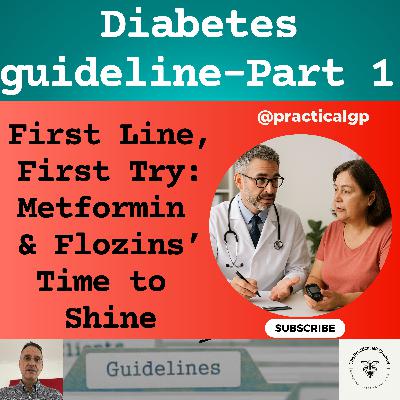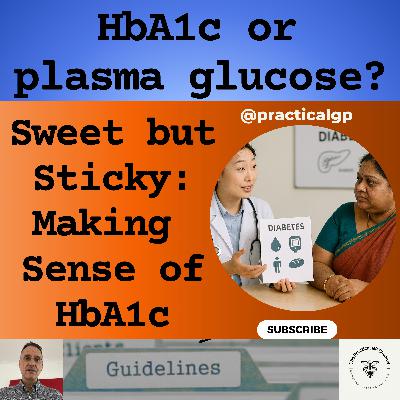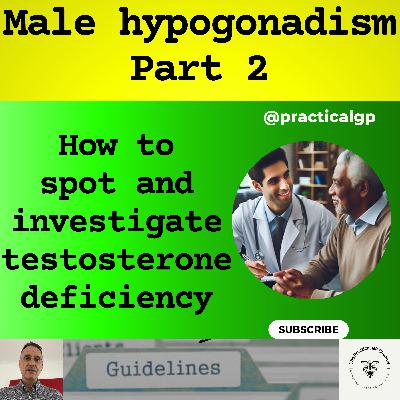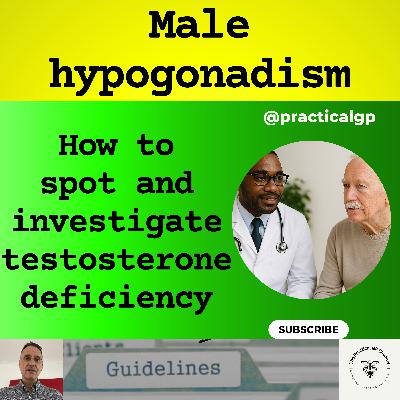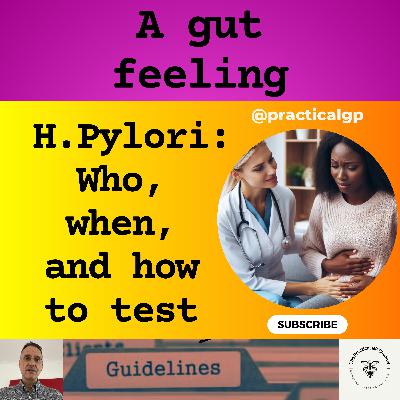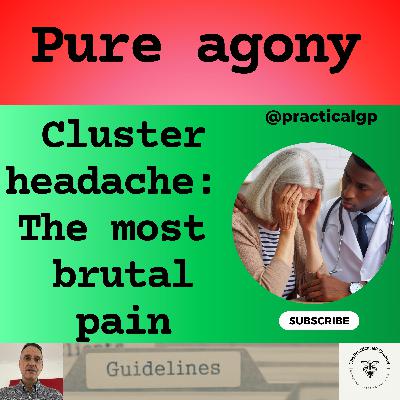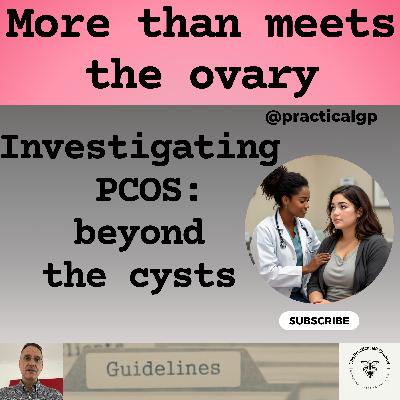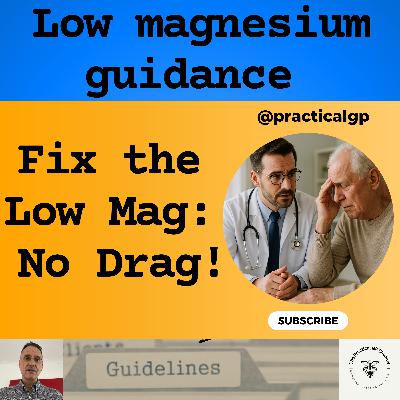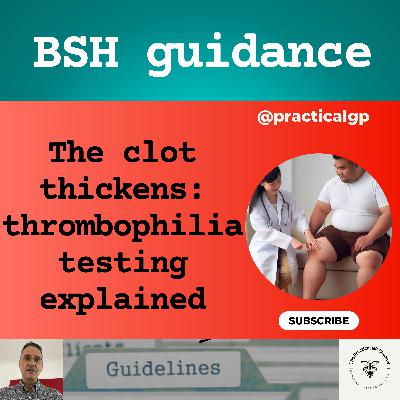Podcast - Managing PCOS: Beyond irregular cycles
Description
The video version of this podcast can be found here:
· https://youtu.be/HQnpwZFnedg
This channel may make reference to guidelines produced by a number of NHS organisations. The content on this channel reflects my professional interpretation/summary of the guidance and I am in no way affiliated with, employed by or funded/sponsored by them.
My name is Fernando Florido (also known as Juan Fernando Florido Santana), a GP in the UK. In this episode, I will go through the diagnosis and primary care management of polycystic ovarian syndrome (PCOS), focusing on what is relevant in Primary Care only. For this advice I have looked at the published advice on the NHS Health website, North East London ICB and Health Improvement Scotland. The links to this guidance can be found below.
In the previous episode, I covered the initial assessment and investigations of PCOS.
I am not giving medical advice; this video is intended for health care professionals, it is only my summary and my interpretation of the guidelines and you must use your clinical judgement.
Intro / outro music: Track: Halfway Through — Broke In Summer [Audio Library Release]
- Music provided by Audio Library Plus
- Watch: https://youtu.be/aBGk6aJM3IU
- Free Download / Stream: https://alplus.io/halfway-through
There is a podcast version of this and other videos that you can access here:
Primary Care guidelines podcast:
· Redcircle: https://redcircle.com/shows/primary-care-guidelines
· Spotify: https://open.spotify.com/show/5BmqS0Ol16oQ7Kr1WYzupK
· Apple podcasts: https://podcasts.apple.com/gb/podcast/primary-care-guidelines/id1608821148
There is a YouTube version of this and other videos that you can access here:
- The Practical GP YouTube Channel:
https://youtube.com/@practicalgp?si=ecJGF5QCuMLQ6hrk
The link to the PCOS information on the NHS Health website can be found here:
· https://www.nhs.uk/conditions/polycystic-ovary-syndrome-pcos/
The link to the PCOS guideline by Primary Care North East London ICB can be found here:
The link to the PCOS information by Right Decisions for Health and Care - Healthcare improvement Scotland can be found here:
Disclaimer:
The Video Content on this channel is for educational purposes and not intended to be a substitute for professional medical advice, diagnosis, or treatment. Always seek the advice of your physician or other qualified health provider with any questions you may have regarding a medical condition. Never disregard professional medical advice or delay in seeking it because of something you have read or seen on this YouTube channel. The statements made throughout this video are not to be used or relied on to diagnose, treat, cure or prevent health conditions.
In addition, transmission of this Content is not intended to create, and receipt by you does not constitute, a physician-patient relationship with Dr Fernando Florido, his employees, agents, independent contractors, or anyone acting on behalf of Dr Fernando Florido.
Transcript
If you are listening to this podcast on YouTube, for a better experience, switch to the video version. The link is in the top right corner of the video and in the episode description.
Hello and welcome, I am Fernando, a GP in the UK. Today, we will go through the primary care management of polycystic ovarian syndrome (PCOS), focusing on what is relevant in Primary Care only. For this advice I have looked at the published advice on the NHS website, North East London ICB and Health Improvement Scotland. The links to them are in the episode description.
If you haven’t already, I recommend that you watch the previous episode where I cover the initial assessment and diagnosis.
Right, let’s jump into it.
And let’s start by reminding ourselves of the referral recommendations.
We should consider endocrinology referral if:
- There are severe symptoms such as signs of virilisation or rapidly progressing hirsutism
- When testosterone is significantly elevated, defined as greater than 5 nanomoles per litre or more than twice the upper limit of normal or
- Abnormal levels of DHEA or dehydroepiandrosterone, androstenedione, or 17-hydroxyprogesterone, which could indicate the possibility of alternative diagnoses such as congenital adrenal hyperplasia, Cushing’s syndrome, or androgen-secreting tumours.
Otherwise, the Management of PCOS is symptom-driven, so we should identify the patient's main concern, whether it's menstrual irregularity, hirsutism, fertility, or metabolic risk.
Also, we should not neglect psychological wellbeing given that many women with PCOS are at increased risk of anxiety, depression, and body image issues. We should therefore screen for symptoms of anxiety and depression as well as other mental health conditions, and offer appropriate management if indicated.
For all patients, lifestyle modification is the first-line of treatment, especially in those who are overweight. A weight reduction of even 5 percent can restore ovulation, reduce androgen levels, and improve insulin sensitivity. Women should be counselled that although PCOS is associated with weight gain, it does not inherently make weight loss more difficult. Referral to local weight management services may be appropriate and could be advised.
Cardiovascular disease risk should be assessed by assessing individual risk factors and we should counsel patients on possible long-term complications including T2DM, hypertension, hyperlipidaemia, CVD, obstructive sleep apnoea and endometrial cancer. Screening for type 2 diabetes is recommended, especially if they have a BMI over 25 or additional risk factors such as age over 40, gestational diabetes, or a family history of diabetes.
Although HbA1c is usually preferred for the diagnosis of diabetes for practical reasons, the North East London Primary care guideline recommend testing with OGTT instead.
Let’s stop here for a moment and ask ourselves, why would OGTT be preferred in PCOS?
There are two main reasons:
Firstly, because HbA1c can miss impaired glucose tolerance given that postprandial glucose spikes may occur early in the disease process, even before fasting glucose or HbA1c becomes abnormal.
Also, HbA1c Can Miss Early Glucose Dysregulation, especially in younger women and those with mild or intermittent abnormal glycaemia. So this is why an OGTT may be preferred over HbA1c in these situations.
But let’s go back to the general management. And, as we said earlier, the treatment should be symptoms driven. So, let’s now look at the treatment in specific clinical scenarios.
From a practical perspective, we should check whether the patient is pregnant or trying to get pregnant. If they are, we should:
· Stop any hormonal treatment
· Offer preconception counselling (including high dose folic acid 5mg if obese)
· Refer them to fertility or obstetric services depending on the situation and
· If pregnant, we should also organise an OGTT
Fertility treatment in secondary care may include ovulation induction with drugs such as clomiphene or letrozole. If these fail, gonadotrophins or laparoscopic ovarian drilling may be considered.
But, if the patient is not pregnant and not planning to get pregnant, we will check which symptom they are most concerned about and treat each patient holistically according to their concerns. This could be:
· Acne
· Hirsutism or
· Oligo or amenorrhoea
Let’s have a look at the management of acne first.
For this we can offer:
· The combined hormonal contraceptive if appropriate,
· Any other acne treatment as per dermatology guidelines or
· We could prescribe spironolactone checking baseline U&Es and considering ongoing monitoring if clinically indicated, for e

